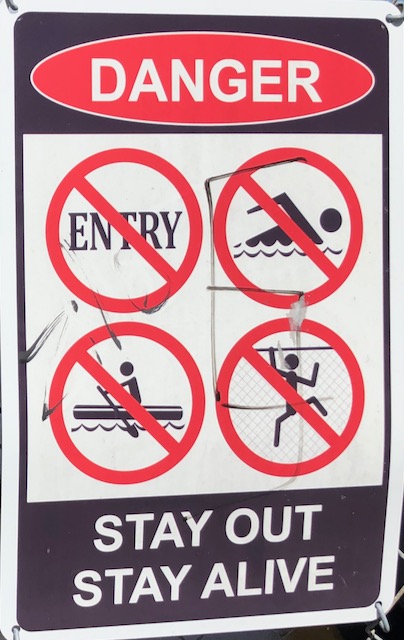What’s in your stress management kit? You’re gonna use it, whatever it is.
Yesterday I was thinking about gun violence in the United States. And that led me here, to tell you not to keep a hammer in your stress management kit.
“When all you have is a hammer, every problem looks like a nail.”
Probably not Mark Twain
I first used that old saw (see what I did there?) in a presentation in 1995. At the time, I thought I’d come up with it myself. But it’s been around since at least the 1960s:
“The First Law of the Instrument states that if you give a boy a hammer, he suddenly finds that everything needs pounding.”
Kenneth Mark Colby
While both these versions are instructive, they actually say very different things. The first is about taking actions based on the tool you have available, even if those actions might be destructive. (You have a problem, and you have only a hammer, so you use the hammer on the problem.) The second is about looking for ways to use the tool you carry, for the sake of fulfilling the tool’s purpose. (You carry a hammer all the time, so you make up reasons to use the hammer.)
What’s gun violence got to do with hammers?
The people who hammer nails are people who have hammers. You may be able to pound a nail with something else (a shoe, perhaps), but you can’t hammer a nail without a hammer. The people who perpetrate gun violence are people who have guns. If you don’t have a gun, you can’t kill someone with a gun. You can kill someone with something else (a shoe, perhaps), but not with a gun.
Whether they are using the tool they carry in order to solve their perceived problem, or they are looking for ways to make use of the tool they carry, there is little doubt that if they did not carry the tool, the tool would not be used. I.e., if they didn’t have a gun, they couldn’t shoot someone with a gun.
I’m not going to try to solve gun violence in this post. In fact, I’m done talking about it for today.
I’m here to talk about the tools you carry, because those are the things you’ll use when crisis hits.

How do you respond to stressful situations?
I’m a big believer in a strengths-based approach to life and work. Being able to use your strengths can lead to greater success, contentment, and alignment. In times of great stress, however, humans tend to over-rely on our strengths. After all, they have made us successful. Wouldn’t they also be what gets us through crisis?
Under stress, funny people crack jokes. Action-oriented people snap into motion. Controlling people grab the reins. Introverts retreat. Thinkers analyze. Learners research. Pleasers try to calm things down.
When strengths are overused, they can turn into detriments: Jokes can hurt feelings. Quick action can cause unintended consequences. Holding the reins too tightly can throttle creativity and engagement. Retreating can allow problems to grow. Over-analysis can delay response. Over-research can complicate the issue. And being overly laid back…
“Peter, this is a problem! Why aren’t you worried?”
In very stressful situations, I naturally turn to calmness and humor. Often, that works well—humor can defuse the crisis, and calmness can bring everyone back to a rational, problem-solving mindset instead of Chicken Little anxiety.
The downside is that people sometimes think I don’t take crises seriously. People think I simply don’t care. They think that if I actually cared about the crisis, I would be freaked out. They think I should be distressed about potential fallout, leaping into damage control activities.
I’ve often been praised for my calm and rational approach to big problems. But I’ve also gotten the opposite reaction.
Chill pills or matches and gasoline?
In one particular case at a previous job, my team was under pressure from a customer service problem. We could all see this was a looming, systemic issue, but it was something we could work through over time.

The way I saw it, we could create one project to work on fixing the system and another to provide extra customer support. It was not an existential issue; it was not going to destroy our program or our team. The sky was not actually falling.
I reached into my stress management kit and pulled out my go-to coping tools: Chill pills. Strategic thinking. Big picture. Communications. Wry wit.
Others on the team, however, had already begun over-using their own strengths and coping tools: Immediate action. Passion. Customer focus. High quality. Responsibility.
Overnight, as a group (prodded by fear and vitriol from people higher up the org chart), they’d done the metaphorical equivalent of piling together everyone’s anxiety, pouring gasoline on the pile, and lighting a match. This response turned what had been a manageable problem into an actual existential crisis for the program, and for the team.
I’d like to say it all ended well, but it did not. Others had already concluded that I’d checked out, and I had already concluded they were fighting fire with gasoline. Six months later, I had left the company.
In the years since then, I have learned an amazing amount about myself from that experience. I hope the others involved have also gained some self awareness. It would be a shame not to learn from failure.
What do you want to carry in your stress management kit?
How do you respond to stress?
How do you want to respond to stress?
What do others need from you in stressful situations?
Stressful situations happen to all of us. We are all afraid sometimes. In stress, we turn to the tools we have nearby, the skills that have worked for us in the past, the training and practice we’ve put ourselves through.

Chitwan National Park, Nepal, 2012
Too often, high performing people think they respond to stress well, when in fact their reaction can be exactly the opposite of what everyone else needs from them. In the example above, my team needed strong, commanding leadership to drive to solutions. Instead, my laid-back approach confused them and made them turn to another leader whose own reaction intensified the anxiety and turmoil, which only escalated the problem.
Today, I carry more than just chill pills and witty humor in my stress management kit. I’ve worked hard to become more aware of my own role in crisis response, and how as a leader I need to show up in ways that maybe aren’t the most natural to me, but which my team needs in the moment.
Are you carrying a hammer or an entire set of tools?
I think I’ve officially tortured this metaphor enough.
Crisis and stress bring out the best in us, but sometimes in the worst ways. If we aren’t actively aware of our go-to responses, and if we don’t have more skills to call upon, the reaction that feels most natural may in fact cause more harm than good. Especially when we over-exert those reactions and sabotage our own intentions.
If you think you could add more tools to your own stress management kit, drop me a line. I can help.



1 Comment
Agree on the problem before solving it - Gray Bear Coaching LLC · August 5, 2024 at 3:32 pm
[…] was the case in the customer service issue I’ve written about before, and I have seen it countless times in other […]